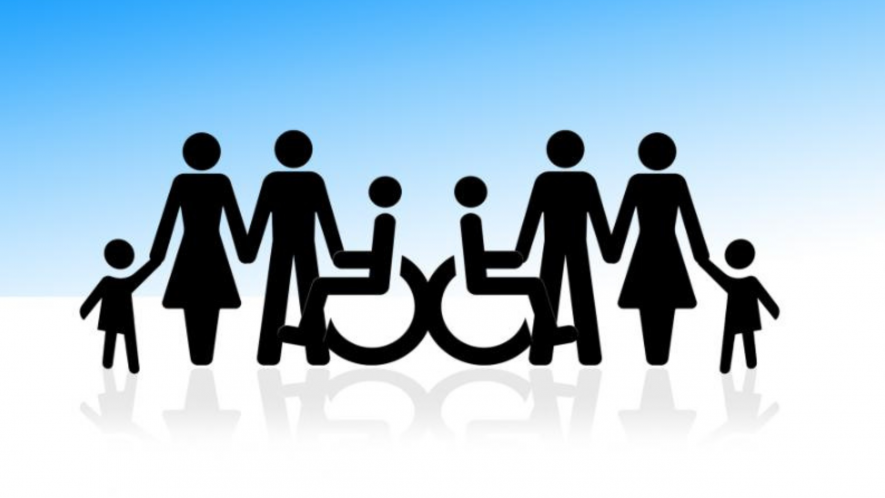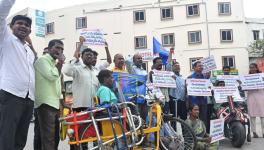West Bengal: State Govt Circular Puts Disabled People Between Rock and Hard Place

Representational Image. File Image
On August 7, 2023, the department of health and family welfare of the West Bengal government issued a circular outlining the modalities of issuing new disability certificates and uniform disability identity cards, aka, UDID. This circular has come after much agitation and advocacy from disabled people of the state. However, far from assuaging the concerns of disabled people and their caregivers, this circular has raised serious concerns.
Circular of confusion
It is stated in the circular that a new portal, named Icon, has been launched to simplify the process of obtaining disability certificates. By logging into the portal, an applicant needs to submit all the relevant details required. Then, he/she is directed to undergo an assessment in a government hospital. After completion of the assessment process, the said certificate would be uploaded to the portal.
It is true that launching this portal would reduce the amount of hardships encountered by people having serious mobility issues and those with high support needs. However, the statement that in future, every disability certificate would be issued through this portal has rankled many.
"What will happen to those who don't have access to mobile phones or the internet?" asked a disability activist. "Disabled people belonging to poor families might be left out," the activist feared.
Exclusion of poor disabled people is but one confusion stemming from this circular.
The same circular mentions that this new portal will be used to issue UDID to the disabled people of the state. This has heightened confusion and consternation among many disabled people. Before delving into the confusion expressed by the disability activists, it is important to recall the introduction of UDID in India.
UDID: Culmination of a struggle
In 1995, the persons with Disabilities (Equal Opportunity, Protection of Rights And Full Participation) Act was passed in Parliament. This was the first generic legislation clearly spelling out the rights of the disabled people. It was mandated in the Act that to avail of the smattering of entitlements prescribed, disabled people need to obtain a certificate mentioning the percentage of disability.
But, from the very outset, the process of obtaining this certificate was cumbersome. Besides, a certificate issued in one state was often not recognised in other states, causing harassment and deprivation to many disabled people. That is precisely why in its first convention held on February 20-21, 2010, in Kolkata, issuance of a disability card accepted throughout the country was the primary demand by the National Platform for Rights of the Disabled (NPRD), which has been raising this demand in different forums ever since. The demand was accepted by the government and the provision of a UDID was incorporated in the Rights of Persons with Disability Act, 2016, which was unanimously passed in Parliament.
Tardy implementation
On January 27, 2017, the Central government started rolling out this card by launching a portal called Swavalamban with much fanfare. Applicants were asked to upload all relevant documents, including disability certificates issued by the respective state governments. After verification of the documents, the department concerned would issue the UDID. So, in order to provide UDID to the disabled, the state governments needed to work closely with the Centre.
However, the implementation of this scheme has remained a cause for concern. A large number of disabled people are yet to receive this card. In fact, many disabled people are yet to receive the disability certificate which is the prerequisite for UDID.
It is evident from the 2021-22 Annual Report of the Department of Empowerment of Persons with Disability tabled in Parliament. The report said that out of a total disabled population of 2,68,14,994 identified by the 2011 Census, only 1,74,25,905 had been issued disability certificates as of January 19, 2022. From among those certified, too, a mere 67,09,894 have been given UDID cards.
This paints a dismal picture. It must be kept in mind that the number of disabled people mentioned in this report is based on the last Census held in 2011. After the passage of the RPD Act, 2016, the number of disabled people has certainly increased, given the fact that the categories of disability have been increased from seven to 21. People afflicted by blood disorders, like thalassemia, haemophilia, sickle cell disease, chronic neurological conditions, Parkinson's as also those with autism, specific learning disabilities have been recognised as disabled.
According to this report, the state that fared worst in terms of providing UDID was West Bengal where only nine cards had been issued. On March 3, 2023, the department issued a circular making UDID mandatory to avail of any benefit under 17 schemes of this department. In the absence of UDID, a disabled person may produce the enrollment number of UDID.
Viewed from this context, the performance of West Bengal becomes all the more troubling because this might lead to many disabled people being excluded from a number of Central schemes. Disabled peoples' organisations, including Pashchimbanga Rajya Pratibandhi Sammilani, the West Bengal affiliate of NPRD, have written to the departments concerned, urging them to take steps to expedite the process of issuing UDID.
Serious concerns
Given the fact that UDID is being made mandatory by the Central and many state governments, it was necessary for the West Bengal government to come up with some concrete steps to ensure that disabled people of the state are not deprived of benefits. However, the launching of the new portal, Icon, has created serious confusion.
First, it is not clearly stated how the disabled people who have already submitted their data in the Central government portal would be issued the UDID card. There is a provision of assessment during the application of UDID cards. However, whether those already declared permanently disabled would have to undergo fresh assessment is unclear.
Also, there is no clarity as to how a disabled person applying for UDID through the Icon portal would get an enrollment number from the UDID portal which, in absence of the card, is mandatory.
Repeated queries to the officials of the health department have failed to elicit a clear answer. All that is being said is that the matter would be made clear soon. Some disability activists have questioned the necessity of launching a separate portal when there is already a Central government portal dedicated to the same purpose that is being used by many states.
Template of Centre-state conflict
According to some observers, the rationale behind this decision is more political than technical. Over the years, it has been noticed that the West Bengal government has chosen not to implement Central schemes or projects in their entirety. They have either renamed or modified the projects. For example, Swacch Bharat Mission was renamed Mission Nirmal Bangla or Pradhanmantri Awas Yojana was named Bangla Awas Yojana.
In some instances, the state government has refused to implement some Central schemes, most notable of which is Ayushman Bharat. Instead, the state government has gone for Swasthyasathi, a health insurance scheme funded by it. Same was the case for PMKisan, a cash transfer scheme for farmers.
This script is now being played out in the domain of disability. It is ironic as well as ridiculous to see the state government taking such a step vis-a-vis disability when the need of the hour is to expedite the process of issuing UDID. The irony lies in the fact that disability is a state subject as per the Constitution. So, the state government could have taken this step much earlier if it so desired. The state government, instead of simplifying the process of certification by decentralising it, has created impediments.
Besides, West Bengal was among the few states that took quite long time to frame rules under Rights of Persons with Disability Act, 2016. Even though it was stipulated in the Act that rules under the act needed to be framed within six months, the disabled people of West Bengal had to wait for two years for the rules.
The apathy of the state government toward this section is evident from their inaction to implement the provisions of the RPD Act, 2016, to bring about positive changes in the lives of the disabled people. In this context, the launching of this portal, Icon, is nothing but a show of defiance at the cost of the disabled people of the state.
This is why some disability organisations have voiced their concerns about this circular. A resolution adopted in a general meeting of Pashchimbanga Rajya Pratibandhi Sammilani, pledged to intensify the struggles along with other like-minded disabled peoples' organisations if disabled people are subjected to more suffering as a result of this circular. It has also demanded that the process of issuing UDID be expedited to the disabled people of the state. According to a section of the disability activists, disabled people must not bear the brunt of the game of one-upmanship between the state and the Centre.
The writer is vice president, National Platform for Rights of the Disabled.
Get the latest reports & analysis with people's perspective on Protests, movements & deep analytical videos, discussions of the current affairs in your Telegram app. Subscribe to NewsClick's Telegram channel & get Real-Time updates on stories, as they get published on our website.























